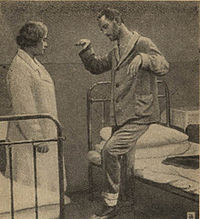
Photo from wikipedia
I read with interest the paper by Mehta et al. (2017) addressing the issue of eszopiclone use for negative symptoms in schizophrenia as it points out to the novel therapeutic… Click to show full abstract
I read with interest the paper by Mehta et al. (2017) addressing the issue of eszopiclone use for negative symptoms in schizophrenia as it points out to the novel therapeutic targets. Authors report on eszopiclone use in add-on therapy to antipsychotics being efficacious for persistent deficit symptoms in schizophrenia treatment including cognitive decline. Non-benzodiazepine hypnotic drugs produce its hypnotic effects via the GABA-A benzodiazepine receptor complex sharing pharmacodynamics with benzodiazepines, in particular, in higher doses (Cubała and Landowski, 2007). In my opinion, as eszopiclone in schizophrenia is reported, the findings on the beneficial effect of benzodiazepines in schizophrenia are worth mentioning. As eszopiclone use in schizophrenia demonstrated efficacy in certain domains in schizophrenia its effect may be attributable to the postulated GABA-ergic mechanism of dopamine level regulation in schizophrenia. The proposed pharmacodynamics is shared with benzodiazepines and associated with direct effect on GABA-A receptors and the GABAergic activity that are believed to be disrupted in the schizophrenia (Nakazawa et al., 2012). GABA neurons carry inhibitory signals that help keep brain activity at optimal levels of operation, Glutamate, on the other hand, carry excitatory signals, both cooperate between themselves maintaining the functionality of the brain. As the interplay between these two exists they keep the dopamine levels in the adaptive levels. The disruption of GABA-ergic transmission in schizophrenia may induce alternations in dopaminergic neurotransmission providing no inhibitory effect to the central glutamate activity causing, resulting in the rise of the dopamine levels being associated with psychosis precipitation. Benzodiazepines are believed to reduce presynaptic dopamine release at the mesolimbic pathway and delay postsynaptic adaptation of dopaminergic neurons to antipsychotics potentiating the action of antipsychotics in resistant schizophrenia. Benzodiazepines also act on mesocortical regions where antipsychotics are less effective and where there is a particular sensitivity to stress. Some evidence for BDZ use in schizophrenia, mostly among BDZ medium and long-acting forms. Interestingly, no data of short-term benzodiazepines were found to be effective as the add-on treatment
Journal Title: Schizophrenia Research
Year Published: 2018
Link to full text (if available)
Share on Social Media: Sign Up to like & get
recommendations!